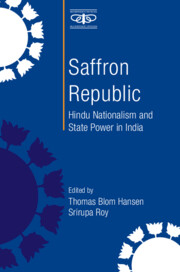2 - New Hindutva Timeline: September 2013–October 2020
Published online by Cambridge University Press: 31 May 2022
Summary
The following timeline is meant to be indicative and does not claim to capture every event of significance in India since 2014. The focus is on events that pertain (either directly or indirectly) to the actions of the Bharatiya Janata Party (BJP)–led central government and the political climate it has cultivated since winning the Lok Sabha elections in 2014.
The events mentioned in this timeline are drawn from media reports published in various English-language newspapers and online news outlets including (but not limited to) The Hindu, Indian Express, Times of India, BBC, NDTV, Outlook India, Caravan, The Wire, Scroll.in, and Live Law. I have also relied on reports prepared by organizations such as the Working People's Charter, Hate Crime Watch, People's Union for Civil Liberties (PUCL), and PRS Legislative Research and an edited volume titled Dismantling India: A 4 Year Report (Dayal, Dabiru, and Hashmi 2018), among others, for information on legislation passed by the central government, Supreme Court verdicts, and human rights and civil liberties investigations between 2014 and 2020.
7 September 2013: Communal violence breaks out in Muzaffarnagar and Shamli districts of Uttar Pradesh (UP) after a year-long campaign by BJP leaders and local units accusing Muslim youth of engaging in ‘love jihad’, that is, marrying young Hindu women with the sole intention of converting them to Islam. The campaign succeeds in polarizing the local community, pitting Jats against Muslims. There are officially sixty-two deaths (of which forty-two are Muslims), and the violence displaces thousands of Muslims to refugee camps. Several incidents of sexual violence (and rape) against Muslim women are also reported.
16 May 2014: The sixteenth Lok Sabha election results are declared and the BJP-led National Democratic Alliance (NDA) is victorious. The NDA wins a total of 336 out of the 543 contested seats in India's lower house (Lok Sabha). Narendra Modi of the BJP is sworn in as the fifteenth prime minister of India on 26 May 2014. The BJP's campaign rhetoric focuses on the promise of achhe din (good days) and a corruption- (and Congress-) free India – crucially though, the BJP benefits from the polarization of local communities in the aftermath of the Muzaffarnagar riots of 2013 that helped to consolidate the Hindu vote across north and central India.
- Type
- Chapter
- Information
- Saffron RepublicHindu Nationalism and State Power in India, pp. 25 - 58Publisher: Cambridge University PressPrint publication year: 2022

